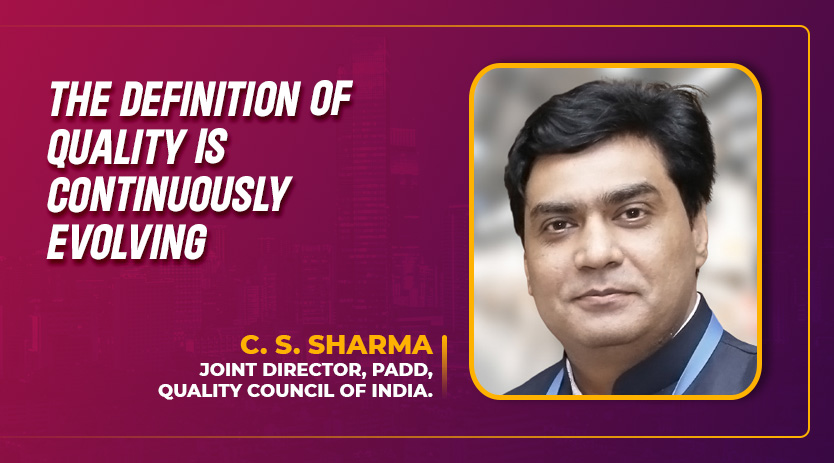The definition of quality is continuously evolving
May 2, 2023 1:45 pm
Mr. C. S. Sharma shares his expertise on the cost of quality, the importance of combining speed, scale, quality for sustainability, and the role of conformity assessment frameworks and certification bodies in ensuring quality.
At all levels, commitment and leadership towards quality are vital, including top management, supervisors, and workers. In India, the Quality Council is the apex body driving quality and accreditation framework in India. India’s quality accreditation framework has been recently ranked fifth globally, a positive sign that India is progressing in the right direction towards becoming a global leader in quality.
Quality is a multifaceted term that encompasses various expectations and aspects. It is a relative term, for example quality of a Mercedes Benz and a Maruti Suzuki Alto shouldn’t be compared, as both are made for different segment of customers. Quality now includes meeting the expectations of all stakeholders, not just customer satisfaction and is continually evolving.
Quality management systems have been in place for a long time. Still, with the integration of Industry 4.0, there is a focus on Quality 4.0, where the entire thought process is rooted in digitisation. By utilising software applications that provide real-time data, analysis, risk management, and risk assessment, decision-making can be more accurate, and the cycle time for maintaining quality assurance and control systems can be reduced. The Quality Council of India is also exploring using chat GPT and AI tools to improve the quality of their day-to-day practices. The scope is wide, with many recent technologies providing an edge to quality practices, leading to high-quality products, services, and sustainable revenue growth.
The cost of quality is a crucial aspect of achieving good quality in all sectors. Despite common belief, attaining good quality is not necessarily an expensive affair. In contrast, poor quality can cost up to 15-35%, or even more, when considering defective products, non-conforming products, rework rejection, scrap downtime, warranty claims, complaints, litigation, and regulatory sanctions, especially in critical sectors such as pharmaceuticals. The cost of attaining good quality like expenditure on systems, competence development, quality assurance and quality control protocols is always less than, that of poor quality in a sustainable business model.
To become unicorns, many startups in India prioritise high volume and revenue. However, to ensure sustainability they should integrate quality with revenue and volumes. Combining speed, scale, and quality is now a globally accepted model for sustainability. There are 2 types of compliance systems that exist in the global compliance ecosystem – one driven by regulators and another voluntary 3rd party system driven through international protocols and standards. Certification bodies offering certifications such as ISO 9001, ISO 14001, and TS 16949 are now recognized globally, and regulators utilize their conformity assessment results to issue licenses and approvals.
Industry 4.0
Industry 4.0 refers to integrating physical and digital realms within an evolving ecosystem. Implementing Industry 4.0 in the coding sector, specifically through CNC machines, has yielded valuable insights, including increased revenue and reduced non-conforming products. Integrating advanced quality technology from Industry 4.0 into our core operations can enhance our current setup and provide additional value.
Quality is crucial across all sectors, whether it involves products or services. When independent bodies review, assess, and certify quality parameters, it would be advantageous for regulators or government bodies to acknowledge these efforts in granting licenses, subsidies, or other financial support.
Cookie Consent
We use cookies to personalize your experience. By continuing to visit this website you agree to our Terms & Conditions, Privacy Policy and Cookie Policy.








